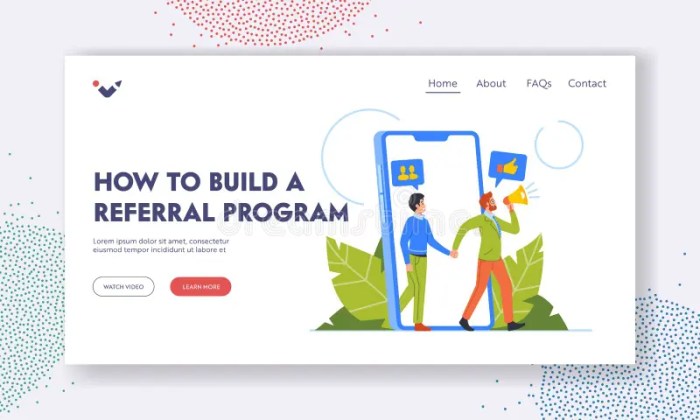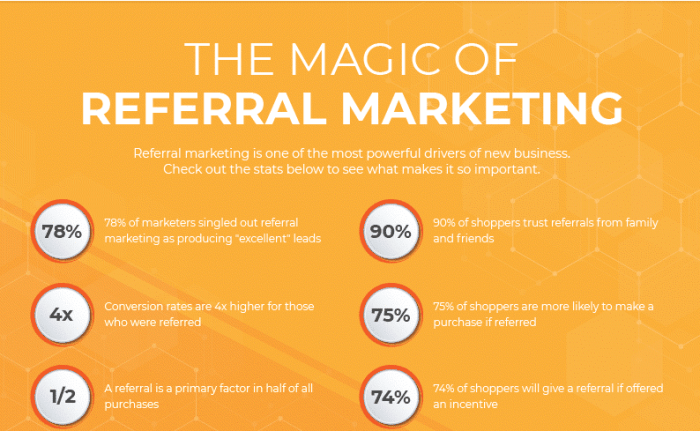Building a Referral Program sets the stage for skyrocketing your business success through the power of word-of-mouth marketing. Get ready to dive into the ins and outs of creating a program that drives customer loyalty and brand awareness.
Importance of Referral Programs

Referral programs are key for businesses looking to expand their customer base and increase brand awareness. By incentivizing existing customers to refer friends and family, companies can benefit in numerous ways.
Benefits of Referral Programs
- Increased Customer Acquisition: Referral programs are a cost-effective way to acquire new customers as they rely on word-of-mouth marketing.
- Enhanced Customer Loyalty: Customers who refer others are often more loyal to the brand, leading to higher retention rates.
- Boosted Brand Awareness: Referral programs help spread the word about a company, reaching new audiences and increasing visibility.
Successful Companies Utilizing Referral Programs, Building a Referral Program
- Dropbox: Dropbox’s referral program offered free storage space to users who referred others, leading to rapid growth in user base.
- Uber: Uber’s referral program rewarded both the referrer and the new user with discounts, driving customer acquisition and loyalty.
- Airbnb: Airbnb’s referral program incentivized users to refer hosts and guests, fueling the platform’s growth and success.
Increasing Customer Loyalty and Brand Awareness
Referral programs create a sense of community among customers, fostering loyalty and trust in the brand. Additionally, by encouraging customers to share their positive experiences with others, businesses can organically increase brand awareness and reach new potential customers.
Designing a Referral Program: Building A Referral Program

Referral programs are a great way to harness the power of word-of-mouth marketing and grow your customer base. When designing a successful referral program, there are key components that you need to consider.
Key Components of a Successful Referral Program
- Clear Incentives: Offer rewards that are appealing to both the referrer and the referee. This could be discounts, freebies, or cash rewards.
- Simple Process: Make it easy for customers to refer their friends by providing a user-friendly referral system.
- Tracking Mechanism: Implement a tracking system to monitor referrals and ensure rewards are given out accurately.
- Promotion: Spread the word about your referral program through multiple channels to maximize visibility.
Types of Incentives for Referrals
- Discounts: Offering a percentage off on future purchases for both the referrer and the referee.
- Freebies: Providing free products or services for successful referrals.
- Cash Rewards: Giving out monetary rewards for each successful referral made.
- Exclusive Access: Granting access to exclusive events or products for loyal customers who refer others.
Setting Goals and Metrics for a Referral Program
- Define Objectives: Decide on what you want to achieve with your referral program, whether it’s increasing sales, expanding customer base, or improving brand awareness.
- Measure Success: Set specific metrics to track the performance of your referral program, such as the number of referrals, conversion rate, and customer lifetime value.
- Adjust Strategies: Analyze the data collected from your referral program and make necessary adjustments to optimize its effectiveness.
Implementing a Referral Program
Launching a referral program can be a game-changer for your business, but it requires careful planning and execution. Here are the steps involved in implementing a successful referral program:
Launching a Referral Program
- Define your goals: Clearly Artikel what you want to achieve with your referral program, whether it’s increasing sales, acquiring new customers, or boosting brand awareness.
- Create attractive incentives: Offer rewards that are valuable and enticing enough to motivate your existing customers to refer their friends and family.
- Select a platform: Choose a referral program software or platform that makes it easy for customers to refer others and for you to track and manage the program.
- Promote the program: Spread the word about your referral program through email campaigns, social media posts, and website banners to ensure maximum visibility.
- Monitor and optimize: Regularly track the performance of your referral program, analyze the data, and make necessary adjustments to optimize its effectiveness.
Promoting the Referral Program to Existing Customers
- Send personalized emails: Reach out to your existing customers with personalized messages that highlight the benefits of the referral program and how they can participate.
- Create social media buzz: Encourage customers to share their referral links on social media platforms and create a sense of excitement around the program.
- Incentivize participation: Offer additional rewards or bonuses for customers who refer multiple friends or achieve a certain number of successful referrals.
- Showcase success stories: Share testimonials and success stories from customers who have benefited from the referral program to inspire others to participate.
Tracking and Analyzing Referral Data for Optimization
- Monitor referral performance: Keep track of key metrics such as referral conversion rate, customer lifetime value, and ROI to gauge the success of your program.
- Identify top referrers: Recognize and reward your most loyal and successful referrers to incentivize continued participation and loyalty.
- A/B test different strategies: Experiment with different incentives, messaging, and referral channels to see what works best and continuously improve your program.
- Iterate based on data: Use the insights gathered from tracking and analyzing referral data to make data-driven decisions and optimize your program for better results.
Maintaining and Optimizing a Referral Program
Keeping your referral program updated and relevant is crucial to its success. By continuously optimizing and maintaining the program, you can ensure that it remains effective in driving new customers and increasing sales.
Incentivizing Referrers and Referees
It’s important to provide ongoing incentives for both referrers and referees to keep them engaged and motivated to participate in the referral program. Here are some strategies to consider:
- Offer rewards for successful referrals, such as discounts, free products, or exclusive deals.
- Implement a tiered reward system where referrers earn more incentives for higher numbers of successful referrals.
- Host referral contests or challenges with exciting prizes to encourage friendly competition among participants.
Leveraging Customer Feedback
Customer feedback is a valuable tool for improving your referral program and making it more effective. By listening to your customers’ suggestions and comments, you can identify areas for improvement and implement changes to optimize the program. Here are some tips on how to leverage customer feedback:
- Send out surveys or feedback forms to participants to gather insights on their experience with the referral program.
- Regularly review feedback and identify common themes or suggestions for improvement.
- Implement changes based on customer feedback to address any issues or concerns raised by participants.
